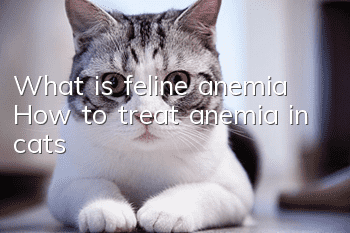What is feline anemia? How to treat anemia in cats?

Cats are prone to a disease called anemia. It is characterized by lethargy and a transition from active behavior to the cat lying down and doing nothing. If you notice these behaviors, it's necessary to make an appointment with your pet's healthcare provider. Your veterinarian will perform the necessary examinations and tests to determine if your cat has anemia. When anemia is diagnosed, most veterinarians will discuss the implications of the condition and the best treatment options. Anemia in some cats is mild and may be caused by environmental or external conditions. They are easier to treat than some of the more complex types. Not all anemia diagnoses lead to catastrophic health complications, but some do, depending on the underlying cause. If your cat is anemic, you may still have questions that you don't think about until after your appointment. We provide a guide that explains the symptoms, causes and treatments of feline anemia to help you understand your cat's health and what you can do to help.
What is feline anemia?
A diagnosis of feline anemia means that your cat has a reduced number of red blood cells in his body. There are two types of anemia. Regenerative anemia is a disorder that triggers increased production of red blood cells in the bone marrow to compensate. Non-regenerative anemia is characterized by a lack of red blood cell production in the bone marrow. Bone marrow cannot meet the body's need to produce red blood cells. Anemia in cats is a serious condition that, if left untreated, can lead to severe illness and death. That's why it's important to make an appointment with a licensed animal health provider if you notice any signs or symptoms of anemia in your cat.
What causes anemia in cats?
The Merck Veterinary Manual explains that there are several causes of anemia in cats. Excessive blood loss can lead to anemia. You may not see internal bleeding. Some anemias are caused by a decrease in hormones that signal the bone marrow to make blood cells. It can also be caused by abnormalities in the bone marrow or by the cat eating foods that suppress essential hormones in the body. Malnutrition and the consumption of foods or substances that are toxic to cats can also cause anemia. Regenerative anemia may be caused by diabetes in cats or an immune response in newborn kittens. Other causes are inherited red blood cell disorders, most common in Abyssinian and Somali breeds. Viruses, bacteria, and parasites can cause anemia in cats.
Feline leukemia and feline immune deficiency are also common causes. If your cat ingests acetaminophen, aspirin, certain metals, chemicals, or foods like broad beans or any member of the onion or garlic family, these things may also cause regenerative anemia. Non-regenerative anemia in cats may be caused by bone marrow dysplasia, bone marrow disease, or enlargement of the spleen and liver. Primary leukemia, pure cell aplastic anemia, aplastic anemia, and iron deficiency may also be causes. Long-term inflammatory infections, tumors, hormone disorders, or hyperthyroidism are also potential causes. Determining the specific cause is critical to developing the best treatment plan.
What are the symptoms of cat anemia?
Anemia can cause a variety of symptoms in cats. The most common and obvious symptom is drowsiness. The symptoms displayed depend on the duration, cause, and severity of the anemia. Symptoms may appear suddenly or gradually, making them harder to detect. Rapid blood loss can lead to a rapid heart rate, low blood pressure, and pale gums. If the anemia is caused by something other than internal or external bleeding, typical symptoms include a yellowish discoloration of the whites of the eyes, skin, and gums and lower energy. Your cat may also feel weak, have low energy, and have a lack of appetite.
How is anemia diagnosed in cats?
There are many potential causes of anemia in cats. Your cat's veterinarian will begin the examination by asking about the cat's behavior and overall health. Tell your veterinarian about all foods, medications, and supplements you give your cat. In some cases, poor diet is one of the causes. Your veterinarian will give your cat a thorough physical exam and order appropriate tests. Routine diagnostic tests include a CBC, a blood test that measures levels of red blood cells, white blood cells, and platelets.
The PCV filled cell volume test, also called hematocrit, measures the percentage of blood volume and indicates the ability of your cat's blood to carry oxygen. Your veterinarian will also order a blood smear test to look at the size and shape of the blood cells to look for any abnormalities. A bone marrow biopsy may be necessary to look at the bone marrow. It is removed from inside the bone using a thin needle. Your veterinarian will also order a urinalysis and check for ingestion of toxins. The main things they look for are poisoning, infection and organ failure.
What is the treatment for cat anemia?
VCA Hospital reports that treatment of feline anemia depends on the severity and cause. Severe anemia can be life-threatening. Your cat may need a blood transfusion. This requires blood typing to find the correct blood type to stabilize the cat while the underlying cause is investigated. When anemia is caused by a parasitic infection, your cat will need to be deformed. If a poor diet is the cause of the condition, your veterinarian will prescribe a strict treatment plan that includes specific types of food and supplements to stimulate the production of red blood cells. The type of treatment depends on the cause revealed by the tests.
What is the prognosis for treating anemia in cats?
Cats with cancer, immune disorders, and anemia caused by toxins have a poorer prognosis. Cats' underlying conditions are treatable and curable, and their outlook is more positive. When the cause of the anemia can be addressed, the cat may recover and go on to live a full, healthy life, but some medical problems that cannot be treated or cured leave medical professionals with no choice but to manage symptoms. Cats with kidney disease mayUndergo long-term hormone therapy. Certain medications can help relieve underlying health conditions and stimulate the production of more red blood cells.
If your cat is diagnosed with a disease called autoimmune hemolytic anemia, the best treatment is a toxin detoxifier and antibiotics to help restore the cat's overall health and remove the disease that is causing the suppression of red blood cell production. toxin. Your veterinarian may prescribe flea and tick treatments and deworming. Sometimes, a combination of medications and dietary changes can effectively treat certain types of anemia. Special diet formulas for cats with kidney damage can help improve kidney function and combat anemia. Corticosteroids can help treat anemia in cats with autoimmune diseases. They are often used in combination with other immunomodulatory drugs and can help relieve a cat's anemia and improve the cat's quality of life.
Can cat anemia be prevented?
This depends on the cause of the anemia. Inherited genetic diseases can only be prevented if cats are screened for genetic diseases before breeding. It is not recommended that you breed a cat that is likely to inherit a genetic disease that causes anemia. Some types of anemia in cats are preventable. You must take the kitten to the veterinarian for a health checkup. Keep your kittens and adult cats vaccinated against feline diseases and prevent ticks, fleas, worms and other parasitic infections by working with your veterinarian to administer the most appropriate solutions and preventative medications. Your cat's veterinarian can provide the best cat food formula for your cat's individual health needs.
Give your cat a healthy and nutritious diet. This is a good start in preventing anemia. Keeping all toxic human foods and other substances out of your cat's reach is another way to prevent anemia. You may be tempted to share yummy treats with your cat, but don't. Many foods that are healthy and enjoyable for humans are toxic to cats. Any food containing onions, leeks, or garlic is dangerous for cats and may cause anemia. Continue regular check-ups and keep your cat vaccinated and parasite-controlled. The purpose of a health check is to detect any problems as early as possible. Early detection and treatment are crucial to keeping your cat healthy. Not all types of anemia in cats are preventable, but many of them are.
Can it promote red blood cell production in cats?
You can increase your cat's red blood cell production by following your veterinarian's recommendations and following the recommendations of your cat's healthcare provider. You can also feed your cat an iron-rich food at home. Look for cat food formulas that contain extra iron. You can also enhance your cat's nutrition by supplementing with iron. Foods containing iron include beef, chicken and pork. It is okay to feed these foods to your cat, but they must be prepared. Choose lean cuts of meat with little fat. Trim off all fat and cook thoroughly.
Excess fat in a cat's diet can lead to pancreatitis and may lead to further health complications. Avoid adding salt or any fragranceingredients or sauce. Vegetarian meat without seasoning is best. You can also feed your cat fully cooked fish or eggs to provide extra iron in the diet. Pet health experts recommend feeding these foods occasionally, as any major changes in the diet can disrupt a cat's delicate digestive system. Before making any dietary changes, it's best to consult your veterinarian. Cat owners with anemia face special challenges in managing their pet's health. Since every cat has individual needs, the odds of success depend on knowledge and consistency in following the recommendations of a qualified healthcare provider. No two cases are exactly alike.
Summary
Changes in your cat's behavior are the first signs of anemia. If you notice that your cat has a change in appetite, is lethargic, and seems to lack the usual amount of energy, it may be time to visit your veterinarian and find out why. If external or internal blood loss is too rapid, anemia symptoms may appear suddenly, but in most cases, symptoms develop slowly and you may not notice. Having a healthy cat requires regular health checkups so any health problems can be caught early. Some types of anemia are preventable, but others are hereditary. In most cases, anemia in cats can be controlled with a combination of diet and medications, depending on the underlying cause.
The veterinarian will ask you a series of questions about your cat, including his diet and health history. A follow-up series of tests can quickly diagnose your cat's anemia and help your veterinarian choose the best treatment to help your cat start feeling like his old self again. When your cat is diagnosed with anemia, the best thing you can do is learn all you can about its potential causes and how recommended treatments will help alleviate the condition. Follow the recommendations of your pet's healthcare provider and do everything possible to be consistent and stick to the recommended course of treatment.
- How old does a cat get its teeth?
- How to prevent cat ringworm? Disinfection of the environment is important
- What does a cat wagging its tail mean?
- These 5 "behaviors" of cats are not acting coquettishly to you, but asking you for help.
- Seven things to note when using anthelmintics for cats
- What is the reason why male cats urinate so rarely? Don’t ignore oliguria and anuria!
- Why do cats like to sleep on people?
- How to tell if a cat has ear mites or has dirty ears?
- Why does my cat always have tear stains? How to clean it correctly?
- Can cats eat "abstinence powder" when they are in heat?



